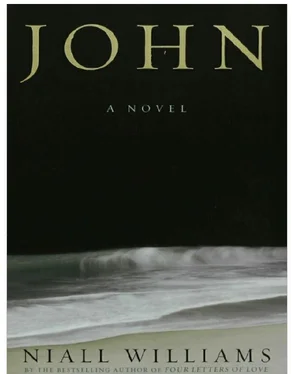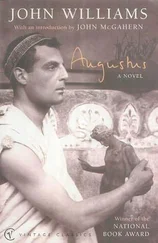After, he tells Papias, 'I, too, must confess. I have forgotten myself. I have forgotten love. I have been harsh and have tired of the burden I carry within me, which burden now is made light as air. Papias, from this day forth the sun shall not set but I will have told you and all our brothers the word of our Lord Jesus. The sun shall not set but I will have related what was, that it will be still. My telling will continue while does my breath till he come again. I confess to you, I have forgotten myself. I have fallen down, but now stand up, my burden light.' John's face smiles, deep furrows paired, cheekbones prominent. He is both the Gallilean fisher, Zebedee's son, John, brother of James, mender of nets a lifetime ago, fleet barefoot boy who ran one end of his father's boat to the other, untoppling, gifted with balance, and also this other, this man who seems footed in two worlds, this and the next. He is the boy and the old man both.
Now he rises. 'We must make ready,' he says.
Ioseph brings him a white stole he lays over the Apostle's shoulders. With Papias he draws two tables together, and for them benches.
The sun retreating, the elders approach. They bring some of the flat fire-baked bread the islanders make, two skins of winter-berry wine. The events of the night past are still in their minds but age and experience and faith quiet the questions. They come nonetheless with the awareness of heightened moment; the storm, the death and return of Papias, the fall of seabirds, are as currents that converge. The call to communion is another such. So as they enter the cave the disciples bear themselves as if to counsel and revelation both. Something is happening, and they are its witnesses.
They stand. John goes to each and takes their hands. None speak of Matthias and the younger disciples, though all notice they are not there. Ioseph goes outside to look. Behind clouds the sun nears the sea. He returns, tells nothing. There opens a long pause.
'My brothers, sit,' the Apostle says at last.
And they do, gathered in the yellow lamplight about the tables, Papias at the right hand of John.
'Brothers, whom I love in the truth, the darkness is past and the true light now shines. Let us give thanks and break bread and take of wine in memory of our Lord Jesus Christ, the Son of the Father.'
'Amen.'
The bread is broken and passed. The elder men watch the Apostle for signs. They can see in his demeanour renewed vigour and purpose. The communion is not yet properly begun when Matthias comes.
'O Beloved. Why do you begin without us? Are we not also chosen children of the Father?' About and behind him Linus, Auster, and the other disciples bear torches and stand in fire glow.
'Indeed you are welcome, brothers,'John says. 'All are welcome to give thanks to our Lord Jesus Christ. There is room at the table. Sit.'
'We do not come to sit,' Matthias says and comes forwards. 'We come to announce the true light. The Divine.'
There is a murmur. Some of the disciples look down. John says nothing, his face held upward, as though to take a blow. Matthias walks to the top of the table.
'I come to speak the truth. For it has been given to me. "I am come a light into the world that whosoever believeth in me should not abide in darkness." '
'You cite the words of our Lord Jesus?' John's anger flares.
But Matthias turns from him, throws open his arms, booms his voice. He glares down at the assembly. 'Why do you speak of Jesus as a messiah? Any of you? Because this ancient says so? Because this Jesus was his friend, because he was the beloved disciple, of this carpenter's son, a Galillean like himself? The Christ? How convenient! His own relation, his neighbour!'
' "I am the resurrection and the life," said the Lord, "he that believeth in me though he were dead shall he live",' John calls.
'How, old man, how shall he live being dead? You are a fool. And all of you who follow him fools, too, who cannot see how he has led you. That he might have caretakers in his ancient years, attendants who serve him in his dotage.'
'Matthias! Be silent,' Ioseph calls.
'I will be silent hereafter. I come this time and this time only to announce to those who will follow. Hear me: there is a light divine. It is the One. It was from the beginning and ever shall be. It is as the prophets tried to tell us. Even as the prophet Jesus. Its illumination I have felt, have touched. I myself His right hand he slaps on his chest twice.
John stands. 'Jesus said: "Verily, verily I say unto you, I am the door of the sheep. All that ever came before me are thieves and robbers, but the sheep did not hear them. I am the door: by me if any man enter in, he shall be saved." '
'The sheep! The door of the sheep! Is that what you think? What you believe, all of you? Are you sheep? Is that what you were born for, to be sheep? Is that a man? A sheep? Is that why you remain here on this rock? O apt indeed! Sheep going through a door?'
Ioseph stands up beside John. 'Blasphemer!'
'Ioseph,' John extends his hand, holds back the other by the shoulder. 'Leave him. Let him to speak.'
'He takes the name of our Lord in vain, Master. Though I am old, I would strike him down.'
John shakes his head. 'Leave be, Ioseph.'
Emboldened, Matthias moves down along the table. 'Listen, listen now this time that ye might know the truth and choose for yourselves. I, Matthias, son of Ignatius of Amphipolis, have been chosen by the One that I might bear his light as witness into the world. The light that was from the beginning and is and ever will be. Which light makes other lights a darkness. Though others preach their own words of God, these are but poor versions of the truth, as candles to the sun. Listen now, I am come to tell you what is. We must be soldiers, not sheep. We must leave here and go out into the world. I fear not. I fear no Roman, nor any man. Nor should any who follows me.'
He comes along the line of disciples, passes Lemuel and Simon and Meletios until he stands behind Papias. Both hands Matthias places on the youth's shoulders.
'I have faced death. I have faced him and fought him myself for this youth who was taken from us. The divine light shone upon me. I was as one lifted from myself. Not in this world nor the next. But in the Presence. The Presence who made me all-powerful against death.' He leans down, his face next to Papias, and speaks loudly. 'This youth was given back to me. As proof. That you might know, that you might believe. Stand, Papias.'
Under the scrutiny of all, uncertain, puzzled, full of torn pieces, hearing for the first time the extraordinary account of his resurrection, Papias stands.
'Look upon him. See. Believe. Behold the miracle.' Matthias allows his witness a moment; he takes a half step back, opens wide his arms as if the youth is a thing conjured out of the dark. He smiles, his head inclined away to better view the marvellous, then he says, 'Papias, go and stand by the others.'
But Papias does not move. His face reddens. All are looking at him.
'Papias,' Matthias raises his voice.
When still the youth does not move, Matthias taps him on the shoulder, then leans in to whisper: 'Papias, you will be the wonder of the world as we walk in it. You will be marvelled at and praised. In time you will recall the truth of what happened and tell to gathered multitudes how death came for you and be living witness of that other darkness. You will spread fear and wonder. You will tell what was and is on the other side of this mortal domain. You shall be by my side as an angel to the Divine, testament to the Omnipotent. Men and women shall fall before your feet. The sick and infirm shall seek the hem of your cloth. Consider. You have been chosen and cannot deny it. It is your destiny I bring you, good Papias. Go, take your place at the forefront of the others.'
Читать дальше










